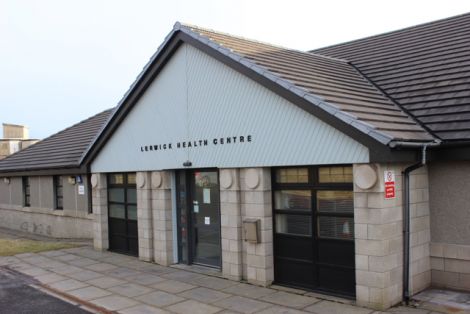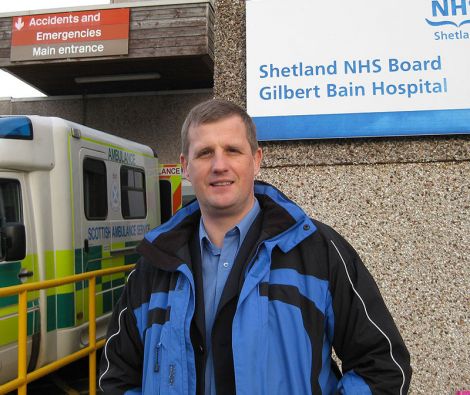News / Health board striving to alleviate GP shortage
NHS SHETLAND has vowed to do everything it can to minimise the impact of a shortage of doctors which means 18 per cent of GP posts in the islands are currently lying vacant.
Following concerns raised by Shetland MSP Tavish Scott, who is calling for the Scottish Government to take “real” action to address the nationwide shortage, the local health board confirmed there were 3.5 posts lying vacant out of a total of 19.75 ‘full-time equivalent’ GP roles.
In response to criticism from Scott about what he described as a “GP crisis”, health minister Shona Robison said that recruiting GPs in remote parts of the country was “always a difficult task” and she understood the “frustration” this could cause local communities.
NHS Shetland chief executive Ralph Roberts said the health board has had to recruit in all of its GP practices in the isles over the past five years. Most of those were filled after “a number of rounds of recruitment”.
“We understand that recruitment and retention of good medical staff is extremely important for us and we will do everything we can to minimise the impact of any vacancies,” Roberts said.
“This is important not only for our patients but because of the impact this has on our staff who have to cover vacancies, and I am extremely grateful for their commitment on this.”
[endif]
He said NHS Shetland recognised that hiring and keeping GPs in the islands was “challenging”, but the health board was tackling it in a number of ways.
Examples include a new contract arrangement for recent GP appointments in Whalsay and the introduction of advanced nurse practitioners at the NHS’s heavily burdened Lerwick Health Centre.
He said: “We are therefore pleased to have a training practice in Shetland and we are keen to support other practices [that] wish to be involved in training GPs to offer as much local experience as possible.”
Become a member of Shetland News
Roberts said it was important to make living and working in Shetland “as attractive as possible”, including ensuring that it was a “really positive experience” for new trainee doctors in the hope that they would apply for permanent jobs in the islands.
He added that NHS Shetland was working on a strategy for primary care setting out the future of its GP services, while it is also “working closely” with Scottish Government colleagues.
In May the health board hosted a visit from the government’s primary care team to discuss future contract arrangements for GPs, while next month it will welcome Professor Lewis Ritchie, who is conducting a nationwide review of primary care out-of-hours services.
MSP Scott said he had recently met Robison to press Shetland’s case. He also pointed to a new online campaign called ‘Save Our Surgeries’, which highlights that doctors, nurses and health service staff carry out 90 per cent of health service work with only eight per cent of the NHS budget.
Scottish Liberal Democrat leader Willie Rennie last week used First Minister’s Questions at Holyrood to highlight a recruitment warning issued by the British Medical Association in Scotland. It said doctors were retiring early or going part time, leading to a “major shortage”, while various reports show growing pressure on local doctors due to GP shortages.
Scott said there was “barely a GP surgery in Shetland which does not face real problems” and the SNP government “cannot keep its head in the sand on this national GP crisis any longer”.
He continued: “Primary health care in Scotland is heading towards a crisis. So that means the Scottish Government need to work with health boards to invest in small GP surgeries.
“Across Shetland these provide vital services for local people, such as dispensing of medicines, emergency and palliative care and covering their own out of hours.
“It isn’t god enough to say that the current approach is working. The SNP government must act now and set out a plan to sort Scotland’s GP crisis.
“Organisations who represent doctors and other NHS staff are all saying these issues must be addressed. GP surgeries from Levenwick to Baltasound can serve Shetland well. We should do everything we can to [make] sure they can serve people in need when that care is required.”
In response, Robison said the SNP administration was “committed to supporting GP recruitment and retention and our investment in primary care has seen the number of GPs across the country increase by seven per cent under this government”.
She said: “Recruiting GPs into remote and rural locations is always a difficult task, and we completely understand the frustration this can cause local communities.
“This issue is not unique to Scotland and we continue to work with health boards and the medical profession to develop recruitment initiatives and are working with the Scottish GP committee to review the contract in Scotland over the next two years.”
She added: “We have already agreed a period of financial and contractual stability for practices between now and April 2017 while we do this work.”
Become a member of Shetland News
Shetland News is asking its readers to consider paying for membership to get additional perks:
- Removal of third-party ads;
- Bookmark posts to read later;
- Exclusive curated weekly newsletter;
- Hide membership messages;
- Comments open for discussion.
If you appreciate what we do and feel strongly about impartial local journalism, then please become a member of Shetland News by either making a single payment, or setting up a monthly, quarterly or yearly subscription.































































